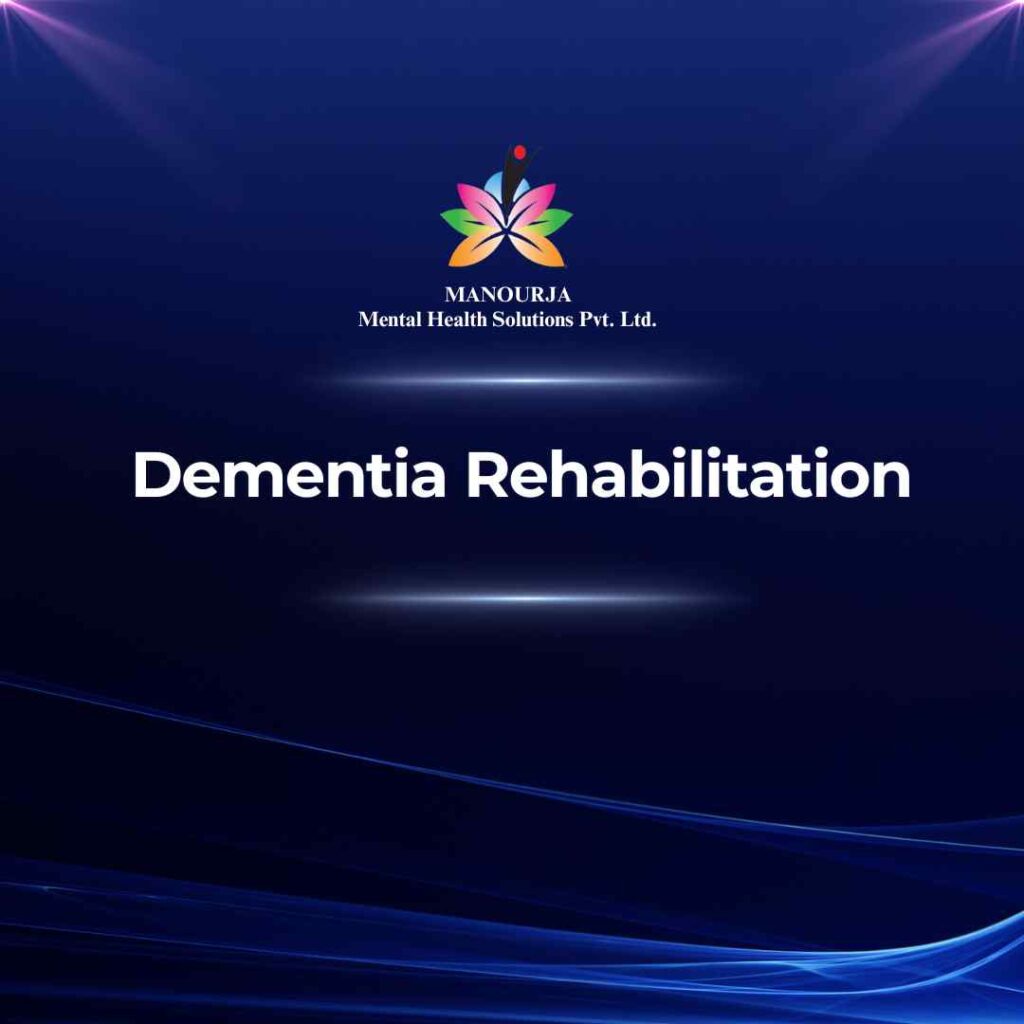Dementia Rehabilitation

Dementia is a progressive neurological condition that affects a person’s cognitive functions, emotional health, and daily functioning. It is crucial for individuals and their families to recognize the early signs and symptoms of dementia to seek timely intervention through psychosocial rehabilitation, which can be either outpatient (OPD) or inpatient (IPD), depending on the severity and progression of the condition.
Signs and Symptoms of Dementia
- Memory Loss: Especially short-term memory loss, affecting daily activities.
- Difficulty in Planning or Solving Problems: Struggles with concentration and managing finances.
- Confusion with Time or Place: Losing track of dates, seasons, and the passage of time.
- Trouble Understanding Visual Images and Spatial Relationships: Difficulty reading, judging distance, and determining color or contrast, which may cause issues with driving.
- New Problems with Words in Speaking or Writing: Trouble following or joining a conversation or struggling to find the right word.
- Misplacing Things and Losing the Ability to Retrace Steps: Placing items in unusual places; inability to backtrack to find them.
- Decreased or Poor Judgment: Changes in judgment or decision-making, for example, paying less attention to grooming or keeping clean.
- Withdrawal from Work or Social Activities: Losing interest in hobbies, work projects, or socializing.
- Changes in Mood and Personality: Becoming confused, suspicious, depressed, fearful, or anxious.
Indicators for Needing Outpatient Psychosocial Rehabilitation (OPD)
- Early or mild stages of dementia where the individual can still perform daily functions with some level of independence.
- Availability of a supportive home environment with family members willing and able to assist.
- Mild behavioral or psychological symptoms that can be managed without full-time supervision.
Indicators for Needing Inpatient Psychosocial Rehabilitation (IPD)
- Advanced dementia with significant loss of daily functioning.
- Safety concerns that require 24-hour supervision (e.g., wandering, aggression).
- Severe behavioral problems or psychiatric symptoms that need intensive therapy and medical management.
Factors Influencing the Decision
- Severity of the dementia symptoms.
- Level of support in the home environment.
- Safety and medical needs.
- The individual’s and family’s preferences and capacity for care.
How Psychosocial Rehabilitation Aids in Treating Dementia
Psychosocial rehabilitation focuses on enhancing the quality of life, maximizing functional ability, and involving the individual in social activities as much as possible. Techniques include:
- Cognitive Therapies: Aimed at slowing cognitive decline and enhancing cognitive function.
- Behavioral Therapies: To address behavioral issues like aggression or wandering.
- Social Skills Training: Encourages participation in social activities to reduce withdrawal and isolation.
- Family Counseling and Support Groups: Educate and support family members managing dementia.
Specific Techniques and Approaches at MANOURJA
- Cognitive Stimulation Therapy (CST): Engaging in group activities designed to stimulate thinking skills.
- Reality Orientation: Regularly reminding individuals about time, place, or person to help reduce confusion.
- Reminiscence Therapy: Encourages discussion of past activities, events, and experiences with the aid of tangible prompts.
- Music and Art Therapy: Utilizes music and art to improve mood and cognitive function, offering a non-verbal outlet for expression.
Steps in Psychosocial Rehabilitation at MANOURJA
- Initial Comprehensive Assessment: Evaluating cognitive, emotional, and physical capabilities.
- Personalized Care Planning: Developing tailored interventions based on individual needs.
- Implementation of Therapy Programs: Regular sessions following the specific therapies.
- Ongoing Evaluation and Adjustment: Monitoring progress and adjusting therapies as necessary.
- Caregiver Support and Training: Providing resources and training for caregivers at home.
In managing dementia, the goal is to maintain quality of life, maximize function, and provide meaningful engagement, reinforcing the value of each individual’s capabilities despite the challenges.
“Each day holds a possibility of a miracle — here’s to finding magic in the moments”
